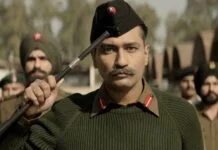Fight Club movie arouses curiosity among audience
Lokesh Kanagaraj stands as one of Tamil cinema’s most promising filmmakers today. When he announced the launch of his production house with a film titled ‘Fight Club’, it naturally stirred curiosity among audiences. This movie also marks the directorial debut of Abbas A Rahmath. Given the title’s history, there’s anticipation to see if the Tamil film lives up to its name.
The storyline revolves around Benjamin (played by Kaarthekeyan Santhanam) and his aspiration for the youth of North Chennai to pursue sports rather than get involved in crime and drug-related activities. He mentors a young talent named Selva (portrayed by Vijay Kumar) to become a footballer, promising support to enroll him in a football club.
However, Benjamin’s brother Joseph (Avinash Raghudevan) and Kiruba (Shankar Thas) tragically succeed in their attempt to murder Selva. This event drastically alters Selva’s life and impacts many other youngsters in North Chennai. Kiruba manipulates Joseph into serving prison time while he himself ascends in local politics.
Upon Joseph’s release, he joins forces with Selva and his gang to seek revenge on Kiruba. Films set in North Madras/Chennai often tread a familiar path, delving into themes of revenge, betrayal, drug trade, and violence. While some manage to spin these tropes into engaging narratives—take, for instance, Vetri Maaran and Dhanush’s ‘Vada Chennai’—’Fight Club’ falls into the realm of stereotypical portrayals.
The film juggles multiple subplots in its initial half. We witness Selva’s family struggling amid hardships while he perseveres to excel in football. His romantic relationship with Shailu (Monisha Mohan) unfolds, alongside Kiruba’s rise to power and the subsequent growth of his associates like Saravanavel (Karthi) in local politics.
Joseph, on the other hand, exploits Selva and his team by involving them in drugs and illicit dealings. This multitude of subplots renders the screenplay excessively chaotic. Director Abbas A Rahmath crafts a compelling first half through a narrative woven with interconnected threads.
The dark humor in this section resonates well and manages to evoke laughter. However, the film loses its grip in the second half due to a lack of substantial material to drive the story forward. Several fight sequences seem devoid of purpose, while the romantic angle between Vijay Kumar and Monisha Mohan Menon contributes minimally to the storyline.
Nevertheless, ‘Fight Club’ boasts robust technical prowess. The cinematography by Leon Britto and editing by Kripakaran stand out, while Govind Vasantha’s music and background score effectively complement the visuals. Performances by Vijay Kumar, Kaarthekeyan Santhanam, Avinash Raghudevan, and Saravanavel aptly suit the film’s tone.
‘Fight Club’ had the potential for a more impactful narrative had it balanced its technical brilliance with a more substantial focus on screenplay development. The technical finesse of ‘Fight Club’ cannot be understated.
The craftsmanship is commendable, with cinematographer Leon Britto’s visuals capturing the essence of the narrative and editor Kripakaran’s work maintaining a cohesive flow. Govind Vasantha’s musical compositions and background score significantly elevate the film’s atmosphere.
The performances delivered by Vijay Kumar, Kaarthekeyan Santhanam, Avinash Raghudevan, and Saravanavel are noteworthy, adding depth to their respective characters. However, despite these strengths, ‘Fight Club’ struggles to reach its potential due to a narrative that favors technical brilliance over substantive storytelling.
The film’s downfall lies in its inability to strike a balance between the technical aspects and a well-structured screenplay. While the first half manages to engage audiences with its interlinked storytelling and dark humor, the second half falters due to a lack of narrative depth.
Many fight sequences feel disconnected from the main plot, and certain subplots, including the romantic angle, fail to contribute meaningfully to the overarching story. In essence, ‘Fight Club’ stands as a testament to director Abbas A Rahmath’s potential and the technical prowess of the filmmaking team.
However, its inability to harness these strengths into a more cohesive and impactful narrative leaves it falling short of its anticipated heights. With a stronger focus on storytelling and a more balanced approach to complement its technical brilliance, ‘Fight Club’ could have been a more compelling and resonant cinematic experience.
Taylor Swift snaps brief shots of boyfriend Travis Kelce’s gameday hairstyle





